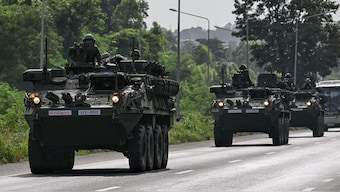U.S. State Dept Calls for Immediate End to Thailand-Cambodia Hostilities Amid Rising Tensions
In a significant diplomatic intervention, the U.S. State Department has urged an immediate cessation of hostilities between Thailand and Cambodia, as escalating tensions threaten to destabilize the region. The call for peace comes in light of recent clashes along the border, which have raised concerns about a potential military conflict that could have far-reaching implications for Southeast Asia.
The ongoing conflict, which reignited this past week, centers around long-standing territorial disputes and accusations of military provocations. Both nations have a complex history marked by territorial disagreements, particularly over the Preah Vihear Temple area, a UNESCO World Heritage site that has been a flashpoint for conflict since the early 2000s. The U.S. intervention reflects not only a commitment to regional stability but also the growing anxiety among international observers regarding the potential for escalation. As previously reported, similar situations in other parts of the world have often led to prolonged conflict and humanitarian crises, making the need for dialogue and resolution crucial.
"We are deeply concerned about the violence and the loss of life resulting from these clashes," said a spokesperson for the State Department. "We urge both sides to engage in constructive dialogue and to prioritize the safety and security of their citizens." The statement emphasizes the importance of diplomatic negotiations over military action and highlights the U.S."s role as a mediator in international conflicts. The call for peace follows reports of casualties and displacement among local populations, underscoring the urgent need for humanitarian assistance and conflict resolution.

Image for U.S. State Dept Calls for Immediate End to Thailand-Cambodia Hostilities Amid Rising Tensions
Experts suggest that the current situation is reminiscent of past conflicts in the region, where national pride and historical grievances have often clouded diplomatic relations. Dr. Elena Martinez, a scholar on Southeast Asian politics, notes that "the international community must take these tensions seriously, as they could spiral out of control." The historical context of the Thailand-Cambodia relationship, characterized by both cooperation and conflict, serves as a reminder of the delicate balance of power in Southeast Asia. The U.S. has previously engaged in similar situations, such as the recent developments in the Israeli-Lebanon conflict, where military actions have escalated regional tensions and prompted international calls for restraint. For more on this, see our related coverage.
The implications of continued hostilities are serious, with potential impacts on trade, tourism, and diplomatic relations in the region. Both Thailand and Cambodia rely on stable border relations for economic prosperity, and any escalation could disrupt not only bilateral trade but also affect neighboring countries. The U.S. State Department"s call for de-escalation is seen as a crucial step toward preventing a larger conflict that could draw in regional powers and complicate existing alliances. As the situation develops, the international community will likely monitor closely, seeking to prevent further violence and promote peaceful negotiations.
Looking ahead, the future of Thailand-Cambodia relations hangs in the balance. The U.S. has positioned itself as a key player in advocating for peace, but the effectiveness of its diplomatic efforts remains to be seen. A successful resolution would require both governments to prioritize dialogue and compromise over nationalistic fervor and military posturing. As demonstrated in previous conflicts, ignoring these calls for peace can lead to devastating consequences. The hope is that both nations can learn from history and work collaboratively towards a sustainable solution, ensuring stability and prosperity for their citizens.


![[Video] Heavy clashes and gunfire reported in Baghdad, Iraq](/_next/image?url=%2Fapi%2Fimage%2Fthumbnails%2Fthumbnail-1768342239932-848qsh-thumbnail.jpg&w=3840&q=75)




![[Video] Gunfire between Iraqi security forces and Sadr militias in Baghdad](/_next/image?url=%2Fapi%2Fimage%2Fthumbnails%2Fthumbnail-1768343508874-4redb-thumbnail.jpg&w=3840&q=75)
